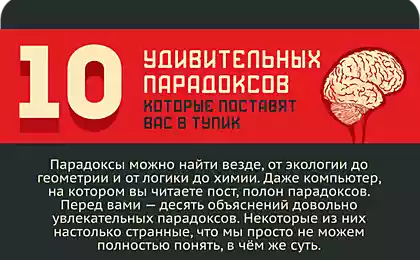1064
Various paradoxes

Source
In this article, we have collected ten of the most controversial paradoxes that show that our world is not as simple as it seems. Who knows, you may be the one to solve the paradoxes below.
1. The paradox of omnipotence
It is a well-known paradox that goes like this: “Ask an almighty man to create a stone he cannot lift.” If such a stone does not work, then man is not omnipotent, and if it does, then man will lose his omnipotence.
There may be several answers. Perhaps absolute omnipotence simply does not exist. It can also be said that an omnipotent being is not bound by the laws of logic, so he can do whatever he wants.
2. The turtle paradox
This paradox was invented by the ancient Greek philosopher Zeno. Assume that Achilles runs 10 times faster than a turtle and is 1000 steps away from it. While Achilles runs 1,000 steps, the turtle will crawl another 100 steps. When Achilles runs 100 steps, the turtle will crawl another 10 steps, and so on indefinitely. As a result, Achilles will never catch up with the turtle. Naturally, we all understand that in real life, he would certainly have caught up with her and overtaken her.
The paradox can be explained by the fact that in reality space and time cannot be divided indefinitely.
3. The paradox of a murdered grandfather
This paradox was invented by the French science fiction writer Rene Barjavel. Let’s say that a person created a time machine, went back in time and killed his biological grandfather in early childhood. As a result, one of the traveler’s parents was not born. Accordingly, the traveler himself was not born. This means that in the end, he did not go back in time and killed his grandfather there and survived.
The options for solving the paradox are again several. Maybe moving into the past is simply impossible. The traveler may not be able to change it. It is also believed that by going back in time, the traveler will create another alternate reality in which he will never be born.
4. The Ship of Theseus
According to ancient Greek myth, the inhabitants of Athens for a long time kept the ship on which Theseus returned from the island of Crete. Over time, the ship began to rot, so it gradually began to change the boards. At some point, all the boards of the ship were replaced by new ones. As a result, a quite natural question arose: “Is this another ship or is it completely different?” And then there was another question: "What if you put another ship out of the old boards, which one would be real?"
In the modern interpretation, this paradox is as follows: “If in the original object gradually replace all the constituent parts, will it remain the same object?”
The answer can be this: any object can be “the same” quantitatively and qualitatively. This means that after changing the boards, the ship of Theseus will quantitatively be the same ship, but qualitatively - already different.
5. The heap paradox
Suppose we have a bunch of grains. If one grain is removed from it, when will it cease to be a pile? will it be a pile if there is only one grain left in it? The paradox is explained by the fact that the term “heap” does not have an exact definition.
6. Abilene's paradox
One hot evening a family was playing on the porch of a domino house until his father-in-law offered to go to rest in Abilene. The trip promised to be long and tiring. However, the wife immediately agreed to go, saying “Not a bad idea!” The husband did not want to go anywhere, but decided to adjust to the others and said that he also seems to be very good idea. My mother-in-law finally agreed to the trip. The road to Abilene was very tedious and hot, so the rest was not successful. A few hours later, the family returned home. Mother-in-law said she didn't like the trip and went only for the rest. The husband said that he too would be happy not to go, but agreed to the trip, so as not to spoil the mood of others. The wife, in turn, said that she did not want to go anywhere, she just wanted to adjust to everyone else. Finally, his father-in-law said that he offered the trip only because the surroundings seemed boring. Thus, none of them wanted to go to Abilene and agreed only for the sake of the others. ?
This paradox is a typical example of group thinking.
7. Grelling's paradox
Let us divide all adjectives into two groups: autologous and heterologous. Autological adjectives are those that characterize themselves. For example, the adjective "multisyllable" is polysyllabic, and the adjective "Russian" is Russian.
Heterologous adjectives are those that do not characterize themselves. For example, the adjective “new” is not new, and the adjective “German” is not German.
The paradox arises when it is necessary to define the adjective "heterologous" to one of the two groups. If it characterizes itself, it is autological, not heterologous.
8. The paradox of mayors
In one country, the decree “Mayors of all cities should not live in their own city, but in a special city for mayors.” The question is: Where should the mayor of the city live?
9. The Paradox of Unexpected Execution
One prisoner was told, "You will be executed at noon next Wednesday." This will come as a surprise to you. The prisoner concludes that since he knows the exact time of execution, the execution will not be unexpected for him, which means that he will not be able to be executed. At noon the following Wednesday, the executioner actually comes after him and he is executed. And the execution really comes as a surprise to the prisoner.
10. Evatla's paradox
This is an ancient logical problem, the essence of which is this: “A certain teacher Protagoras took Evatl as his disciples and began to teach him the case of the court. Evatl promised to pay for all the tuition as soon as he won his first case. However, after training, Evatl was in no hurry to work. Then Protagoras sued him. As a result, the judge could not make any decision, because if Evatl wins this case, he will be obliged to give the money to Protagoras. In this way, he will actually lose, which means that he will not have to pay for his studies to Protagoras. And so on forever.























